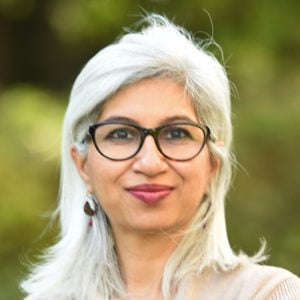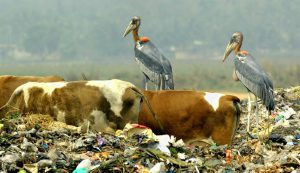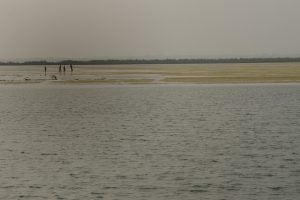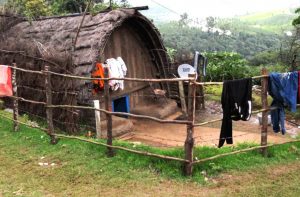Simi Kamal is one of Pakistan’s foremost water experts. Having studied geography at Cambridge University, she has worked in the fields of social development, water, irrigation, environment, food security and climate change. She is the voluntary chair of the Academic Committee of Hisaar Foundation and the convenor of Hisaar Foundation’s Think Tank on the Rational Use of Water.
This Think Tank has recently brought out and launched Recommendations for Pakistan’s Water Policy Framework, which is being referred to as the ‘citizen’s water policy’.
Kamal spoke to thethirdpole.net about the challenges of drafting a water policy for Pakistan, what her team at the Think Tank on the Rational Use of Water has drafted, and the challenges and opportunities for Pakistan’s future.
Zofeen T Ebrahim (ZTE): Why doesn’t the government of Pakistan have a water policy yet?
Simi Kamal (SK): They have been going on for the last 25 years that there is a water policy in the making. Many years ago, I used to write comments on behalf of the government of Sindh and civil society. What I saw was that as this work went on each version was worse than the first one. It was a whole wish list of what has to be done.
Now for a policy to be called a policy, it should have a time frame, an objective, a few things that are to be done and it should provide some idea of how it is to be done. Just writing a list of things does not constitute a policy. So the last few years, when WAPDA [Pakistan Water & Power Development Authority] undertook a whole series of dialogues, I went to many of them and even presented my papers. More and more issues were being added and there was no one sitting down and saying, “Hey, wait a minute we can’t do ALL of this.” So we have to take those decisions and actions which are doable and feasible within the kind of money and resources available in this country.
![Pakistan's water infrastructure needs critical upgrades [image by IFC/Nicola Saporiti]](/wp-content/uploads/2017/03/IFC-infrastructure-Nicola-Saporiti-2.jpg)
SK: When we, the citizens, through the Think Tank on Rational Use of Water, sat down to do this work it took us two and a half years, maybe even a bit more and it wasn’t easy. There were certain principles we worked on: that everyone’s voice would be heard, and that people both inside and outside the water sector should have a say. We implemented these principles by ensuring that three of the eight members of think tank were water specialists the rest were from other sectors – people who have served in the government, people from the corporate sector, in media and others. We tried to ensure that there were people from all over Pakistan.
We believe that if we can create consensus in this tricky sector in Pakistan, than we can build consensus on anything. It is not about one interest group forcing its own viewpoint on everyone else. We know it is very tough, because some very fundamental changes have to be made if we want to be able to safeguard our water resources, use them judiciously and have the resource available for future generations. It will mean that some people will have to loosen up on their interests and certainly Punjab, being the big province andthe most advanced, has to sit back and let go some of the arguments on which water distribution is being built.
ZTE: Beyond building consensus, what are the other issues?
The first thing we believe is that you cannot say that water sharing is only about the surface water. We believe that water sharing in Pakistan should be about all water available. If one area has more ground water, it will get less surface water or if one area gets adequate rain then it doesn’t need to have water from other sources.
So we begin by saying that water is our source and we have to safeguard it. Land and water are the only resource of Pakistan on which we can build development. We have a few minerals but not that many, we don’t have oil and gas is also limited. That is why the water economy of Pakistan has to be recognised.
ZTE: What is the role of the various actors in the water economy?
SK: The government needs to raise funds for this; our own banks need to raise money for this. Why do have to go running to World Bank or some other bank to ask for money and then they put all kinds of conditionalities [on loans]? And then they only talk about big dams, because people don’t want to talk about smaller bits of money that are required for infrastructure, management and replacement.
Our assets include this world’s largest continuous irrigation system. Our banks should be able to provide funds for us to maintain and rebuild the infrastructure. For this they have to understand that there is a return if they invest in the water sector.
![With water bonds, Pakistan could fund the infrastructure it needs [image by IFC/Nicola Saporiti]](/wp-content/uploads/2017/03/IFC-infrastructure-Nicola-Saporiti.jpg)
ZTE: Do we need big water infrastructure systems?
Unless we fix the downstream leakages, in my personal view we should not be building any bigger infrastructure. If we fix existing problems we will already have twice as much water. For example if only 30% of the water that is mobilised reaches the farm gate, let’s take it up to half or two thirds – let’s take it up to 90% first and then talk about the dams. I think this is our rational and objective way to move forward. Otherwise you build heavy infrastructure and you lose a lot of it from leakage downstream.
Now it also needs to be understood that when we say “loss of water”, water doesn’t disappear forever. It goes somewhere. In Punjab it contributes to the sweet water aquifers. In Sindh, water seeps down and contributes to saltwater. Once water becomes saline it cannot be used by everyone for agriculture and other purposes.
ZTE: Who needs to act?
SK: The government needs to wake up. It needs to demonstrate leadership. It’s not something that small individuals, small Pakistani companies, or civil society structures can do. Our job as citizens is to keep pushing the government. We have now provided something. It’s a ten year policy. It has facts and figures in it. It has five focus areas and ten actions. That’s it and we are not going to waiver from it. If the standing committee in parliaments, or the ministry of water and power, or the climate change ministry, other relevant ministers and the irrigation departments want to act, everything that needs to be done to fix the problem is there.
We are not saying that this is the government’s policy; this is a citizen’s piece of paper in which a lot of love, thought, passion and hard work has gone in. We are asking the government to take it seriously. The provinces don’t have to wait for the federal government to do something. We have identified what the provinces have to do. Let them go ahead. The basis for this is that everyone must get water for their human needs, drinking needs, domestic needs. This should be free and all water beyond that must be paid for.
ZTE: Can you share some details?
SK: We are saying that every districts entitlement to free water should be worked out in terms of how many people live there. Beyond that, we need to work out how much a district needs based on its potential for agriculture, industries etc. People should pay for it and that much water should be supplied to it. Now whether it comes from ground water, surface water or rain needs to be worked out and. Or if has a great irrigation system then ground water exploitation in that area should be stopped so that people in other areas can get water.
This is not rocket science, but it requires leadership, commitment, and it requires the understanding of citizens as well as the government and water providers that this is the only way forward.
![<p>Members of Hisaar Foundation’s Think Tank on the Rational Use of Water with other staff members [image courtesy: Hisaar Foundation]</p>](https://www.thethirdpole.net/content/uploads/2017/04/Members-of-Hisaar-Foundation’s-Think-Tank-on-the-Rational-Use-of-Water-with-staff-members-of-Hisaar-Foundation.-300x200.jpg)




